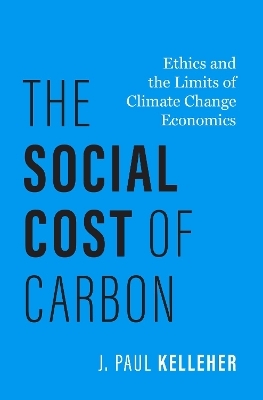
The Social Cost of Carbon
Ethics and the Limits of Climate Change Economics
Seiten
2025
Oxford University Press Inc (Verlag)
978-0-19-768779-6 (ISBN)
Oxford University Press Inc (Verlag)
978-0-19-768779-6 (ISBN)
- Noch nicht erschienen (ca. April 2025)
- Versandkostenfrei innerhalb Deutschlands
- Auch auf Rechnung
- Verfügbarkeit in der Filiale vor Ort prüfen
- Artikel merken
The social cost of carbon (SCC) is a monetary measure of the lasting harm caused by emitting one additional ton of carbon dioxide into the atmosphere. By examining the foundations and limitations of the concept, the book evaluates the role and usefulness of the SCC in climate policy discussions.
Called the "the most important number you've never heard of" by leading environmental economists, the social cost of carbon (SCC) aims to capture in a precise number the harm caused by emitting a single ton of carbon dioxide into the atmosphere. In The Social Cost of Carbon, J. Paul Kelleher offers a systematic analysis of the social cost of carbon, its theoretical basis, and its proper role in climate economics and climate policy design.
The book explains that the SCC is not one concept but four, each of which is addressed to a distinct task in climate economics. Moreover, these concepts can be sorted into two families that correspond to the two branches of welfare economics, social choice theory and general equilibrium theory. Kelleher draws on these radically different theoretical frameworks to explain how a mathematically identical pair of SCC concepts can emerge from each. He then argues that the analytical power of each SCC concept is limited by its inability to fully capture the ethical considerations that bear on responsible climate policy.
The book concludes by explaining how some SCC concepts can and should be put to work in real-world climate change policy analysis-providing practical advice for translating the SCC into tangible change.
Called the "the most important number you've never heard of" by leading environmental economists, the social cost of carbon (SCC) aims to capture in a precise number the harm caused by emitting a single ton of carbon dioxide into the atmosphere. In The Social Cost of Carbon, J. Paul Kelleher offers a systematic analysis of the social cost of carbon, its theoretical basis, and its proper role in climate economics and climate policy design.
The book explains that the SCC is not one concept but four, each of which is addressed to a distinct task in climate economics. Moreover, these concepts can be sorted into two families that correspond to the two branches of welfare economics, social choice theory and general equilibrium theory. Kelleher draws on these radically different theoretical frameworks to explain how a mathematically identical pair of SCC concepts can emerge from each. He then argues that the analytical power of each SCC concept is limited by its inability to fully capture the ethical considerations that bear on responsible climate policy.
The book concludes by explaining how some SCC concepts can and should be put to work in real-world climate change policy analysis-providing practical advice for translating the SCC into tangible change.
J. Paul Kelleher is Associate Professor of Bioethics and Philosophy at the University of Wisconsin-Madison, where he is affiliated with the Energy Analysis and Policy program and the Nelson Institute for Environmental Studies. His work focuses on ethical and philosophical issues concerning public policy, especially climate change policy and health policy.
| Erscheint lt. Verlag | 11.4.2025 |
|---|---|
| Reihe/Serie | Philosophy, Politics, and Economics |
| Zusatzinfo | 3 b/w images |
| Verlagsort | New York |
| Sprache | englisch |
| Maße | 156 x 235 mm |
| Themenwelt | Geisteswissenschaften ► Philosophie ► Ethik |
| Wirtschaft ► Betriebswirtschaft / Management ► Unternehmensführung / Management | |
| ISBN-10 | 0-19-768779-2 / 0197687792 |
| ISBN-13 | 978-0-19-768779-6 / 9780197687796 |
| Zustand | Neuware |
| Informationen gemäß Produktsicherheitsverordnung (GPSR) | |
| Haben Sie eine Frage zum Produkt? |
Mehr entdecken
aus dem Bereich
aus dem Bereich


